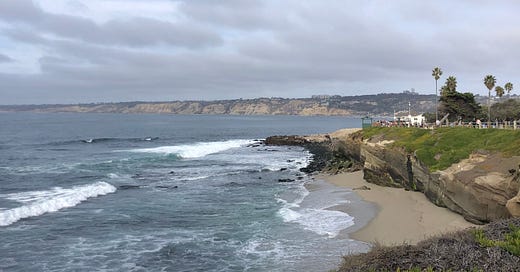I’m going to keep it short today, and to what I need to hear, which I guarantee is also what at least a few of you also need to hear.
For the past many weeks, I’ve been lost in planning for a theoretical future; trying to plan what will happen next week, and in May, and in August; worrying about how I’m going to figure it all out. My ego thinks it’s my job to figure everything out—how arrogant, really.
For so many of us, the future is plagued by a sense of worry or pressure to plan: we want to dispel uncertainty; make the unknown known.
That’s true for me: it’s not so much that I fear the future, but worry about the uncertainty that accompanies it. What will happen? What will I need? What might I need to prepare for?
I think, deep down, we all know that the future is ultimately unpredictable, even if we guess pieces of it right, sometimes. Despite all the planning and preparing we do, we will never know how we will feel, what we will want to do, or what will happen until it happens. In other words, we can try to plan for the future all we want, but we will always and necessarily be missing a huge piece of the puzzle: all that has yet to come. The information that we don’t have, yet.
Worrying and mentally planning for the future is more or less a pointless waste of energy. I know this because when I’m in a relaxed headspace, I actually don’t worry about the future, at all. When I feel confident about where I am, now, I trust my future more, as well as my ability to handle it.
It’s funny how often the messages we need to hear are the same ones, over and over. For me, those messages are always to trust myself and to turn my attention to here, now. As it relates to the future, both apply.
Trust yourself.
Focus on here, now.
Whatever the future brings, we will need to be there in order to deal with it. The best thing we can do for the future is focus on life now, and not get lost in trying to predict and prepare. It’s a waste of time; it makes us anxious and strips this moment of the beauty it has to offer.
I constantly come back to this quote by Ram Dass, from his talk called “The Paradox of Planning for the Future”.
“The best practice for being fully present at that moment of choice is to practice being present in this moment.
Since the planning for that future situation is missing the existential components that will exist in that situation, you are planning in the absence of all the data.
What will happen is that when I get there [to the future], if I’m so wedded to the plan I had made then [in the past], I will do violence to what the existential moment is in order to impose my plan at that time…
We’re all used to doing that all the time; we’re all used to having plans, with our inertia of mind, and the inability to let go of our plan into the new moment leaves us strangely out of sync with everything.”
Essentially, he says, clinging onto the idea of what the situation was “supposed” to be like, or to what we wanted to have happen, prevents it from unfolding organically—and creates a lot more mental anxiety because of it.
“You end up destroying what new thing could be, because you can’t hear it, because of your attachment to your old model.”
Ram Dass, in the classic way of most good spiritual teachers, urges us not to listen to what he says but to find this out for ourselves by paying attention. Notice when we cling to our plans, get lost in worry, become out of touch with the present moment. As we do this more often, he says, we will realize that being here, now is the best thing we can do to prepare for the future.
“After you begin to observe this phenomena occurring again and again, that way in which you make plans and hold very tightly to them, you will eventually begin to realize that the fullness of being in this moment, which includes the future and its plans, is the best preparation for when that time is here now.
So being here now is the best preparation for when you are there then or when there then is here now.” — Ram Dass
The critical step to disengaging in future-tripping or future-planning is to root yourself back in the present and move from there. It seems anticlimactic to focus on now instead of then—even mentally aggravating to do so—but it’s deeply stabilizing. Remembering to trust ourselves and experience now is perhaps the greatest gift we can offer our future selves. The future and all its events will occur; we will experience there then, when there then arrives. Let us not waste more of our precious time trying to figure out what isn’t here, now.
Let us focus on today.
Let us trust ourselves to figure out tomorrow—and next week, and in six months—when that time comes.
Let us be here now, while we’re at it. We might need it later.
Maggie



